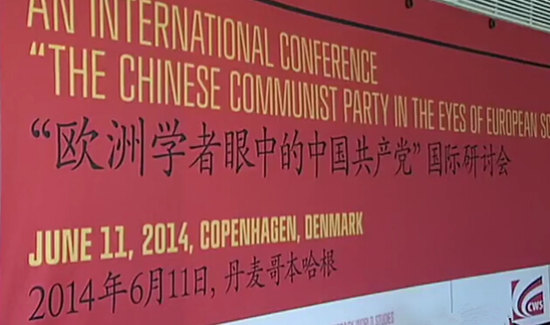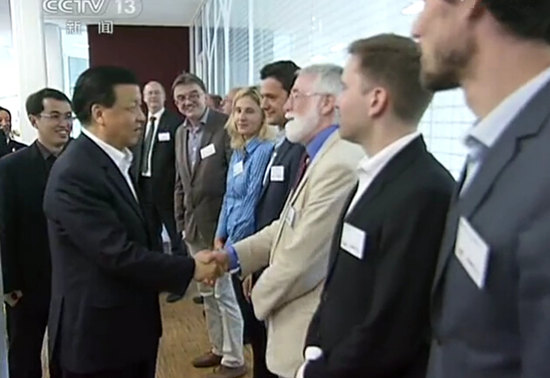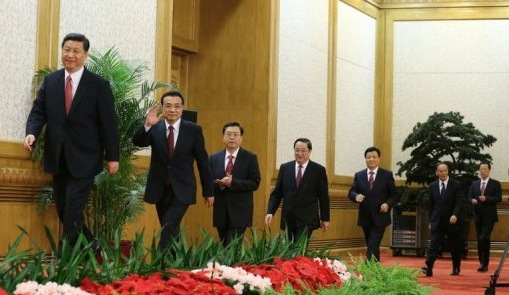6月11日,中共中央政治局常委刘云山访问丹麦期间,参加了“欧洲学者眼中的中国共产党国际研讨会”并发言,主办方是丹麦哥本哈根商学院和中国当代世界研究中心。李世默在研讨会上做了题为“从全球视角看中国研究的新动向和中共形象的新变化”的发言。中共中央政治局常委在国外直接与海外中国学学者面对面交流,在历史上是罕见的,也许这标志着中共正自信而开放地走向世界。
观察者网全文首发,以飨读者。

欧洲学者眼中的中国共产党国际研讨会(视频截图)
现代西方的中国学研究大致经历了两个代际的变化。第一代是历史主义流派主导的,第二代是意识形态至上流派所主导的。当代西方对中国的认知,不论是学术界或大众媒体,都深受这两大代际流派的影响。
我认为,当下,海外中国学正迎来新的一代,即第三代。第三代中国学发端于新的形势背景下,研究方法和取向都不同以往。这一代流派的演进,将推动中国学从基础结构上发生转型,并使世界对中国的认知产生决定性影响。这对中国共产党来说意义深远,作为中国政治治理模式的核心,中共将有能力深刻影响中国学的结构和方向,并从根本上改变中国的国际形象。
首先,我们稍微回顾下历史。
现代中国学研究的第一代,可以追溯到20世纪初,以史景迁、傅高义等杰出学者为代表。他们用历史主义的语境研究现代中国,研究方法深受中国传统文化影响,研究领域涵盖了中国的政治、历史、社会状况和引领中国现代史的领袖人物。这些研究,为人类知识宝库增加了新的瑰宝。
中国学的第二代,始于1989年,在后冷战时代的意识形态狂热中诞生。这一时期的研究,被历史决定论引入歧途,陷入自由民主或专制独裁的意识形态两元对立。在研究取向上,强调政治立场先行和意识形态挂帅,目的只有一个,即证明中国的政治制度必然崩溃。在研究方法上,则十分类似美国竞选中常见的“敌情研究”。可惜,这一代流派的研究一再被中国成功发展的事实证伪,备受质疑,如今摇摇欲坠。我预判,这一派的未来前景极其有限。
梳理完过去,让我们再来看看当下。

刘云山会见与会学者(视频截图)
最近几十年来,中国全方位快速崛起,其巨大影响波及至世界各个角落。全球政治、历史、经济研究的顶尖人士,纷纷聚焦中国,希望探究这一历史重大事件的深远含义。这个群体不再象前两代那样限于中国通,而是来自各个领域,他们便构成了第三代中国学的主体。
这第三代中国学呈现两个趋向,一个是理论派,即试图用西方现有的政治和国际关系理论,来分析和解读中国模式,譬如建构主义,“正当抗争”理论,“社会团结”理论,“受众理论”等。在我看来,这种用抽象教条硬套鲜活现实的研究方法很不可取,极有可能重蹈意识形态挂帅式研究的覆辙。
另一个趋向可以称为实证派,即以收集客观数据为基本研究方法,客观分析中国的治理模式。这一派中不少人是世界知名学者,比如弗兰西斯·福山的政治学研究,尼古拉斯·拉迪的经济学研究,以及傅泰林的国际关系研究。更值得注意的是,这一派中很多是年轻一代的学者。
在我看来,实证研究高度关注政府治理,聚焦于具体问题,以实际数据为支撑,回应了世界客观认识中国的需求,对各国的政治治理也提供了借鉴。实证研究的兴起,标志着学术界正从意识形态论战转向务实分析,发展前景非常广阔。
新一代中国学研究吸引了当今世界最杰出的学术精英。其原因主要有两点:首先,中国崛起影响全世界,世界需要了解中国,特别是中国的治理模式。第二,当今世界上许多国家,包括美国和欧洲各国和很多发展中国家,正遭遇史无前例的政治治理困境。全世界都在反思后冷战时代对政治治理的共识。而中国的成就有目共睹,对中国政治治理的积极研究,有望为世界打开新视角,找到新钥匙。
但是,这一代中国学要想真正实现跨越,还面临一道障碍亟待排除。这就是,中国共产党是中国政治治理的核心,迄今其角色、原理却极少为世界所客观认知。
应该说,无论从理论上还是实践中,中共都是中国政治当之无愧的领导核心。但是,从中华人民共和国成立起,中共一直将自己隐藏在一个貌似和其他所有现代政党国家一样的国家体制内,这是一个很奇特的现象。
其实,几乎所有人都知道这不是事实。众所周知,中国的政治治理模式在当今世界上独一无二。中共的干部选拔制度复杂有序,中共的政策决策机制和反馈机制科学严密。遗憾的是,全世界很难了解到这些细节。

中共正自信而开放地走向世界
我们正站在一个新时代的起点。意识形态挂帅的迷雾正在散去。在“后意识形态”的时代,提高治理能力和找到有效的解决方案,是各国各类政党的核心任务。各国学术界都在苦寻良方,以拯救自己免于现实之水火。
社会科学界几乎每一个领域里的新一代学者,都意识到今天中国的重要性。他们都已经深知,不深入研究中国的案例,就无法全面理解和解读当代世界的政治治理。中国的发展可以说是当今世界在政治治理模式上最重要的尝试和探索。现在他们又逐步发现,要想深入研究中国治理,不深入了解中共,就无法真正搞清楚。万法归宗,要揭开中国成就之谜,钥匙是研究中共,可谓条条道路通中共。那么,中共会走上前台、会自己撩开神秘面纱吗?中共的“秘方”能改变世界对中国的认知吗?能促进世界全面革新政府治理的时代理念吗?
答案不仅是肯定的,而且是令人鼓舞的。新中国成立65年来,特别是邓小平启动改革开放36年来,中共以人类历史上最快的速度,带领人类历史上最大规模的人口,实现了人类历史上最大幅度的生活水平的提高。中共的治理秘笈博大精深、独一无二。这一秘密的揭晓,将拓宽整个世界的政治经济视野。
或许,今天我们正站在一个新时代的开端。在这个新的时代里,中共将以开放的姿态走到台前,世界将以客观务实的态度一窥中共这一当代政治治理学里最重要体制之堂奥。
这个时代需要双方相向而行。中共需要进一步开放,学术界需要更多严肃学者的投入。要做的工作很多,但并不需要太久,经历了前两个代际流派之后,在第三代学者手中,我们就有望创造出一个全新的知识体系,贡献给世界的政治治理研究。中共也有望极大地改变世界的认知,改写当代世界的中国故事。
或许,到那一刻,我们回望今日,会发现,今天正是这个丰收时代的开端。
(请翻页查看英文原文)
[NextPage]EMERGING TRENDS IN CHINESE STUDIES AND THE ROLE OF THE PARTY
By: Eric X. Li
In the modern era, Chinese studies in the West have gone through two main generations: the generation of the historic school and the generation of the ideological school. Contemporary Western perceptions and understanding of China, in both the academic world and popular press, have been informed by the methods and aims of these two schools.
I would like to suggest that we are at the beginning of a new phase. A third generation is emerging. This new generation is approaching China with new methods and different aims within different contexts. This development has placed the fundamental frameworks of Chinese studies in transition. How this evolves will have decisive impacts on the world’s interpretations of China. As such, the contemporary CCP, the party, as China’s central governing institution, is in a position to exercise significant influence over the future landscape and conditions of Chinese studies and thereby China’s image in the eyes of the world.
First, let’s summarize the past.
The first generation, the historic school, has guided the world’s understanding of China since early 20th century. Its ranks have been filled with illustrious scholars, such as Jonathan Spence and Ezra Vogel. They seek to study modern China in an historical context and thereby better understand the nation’s trajectory. Their methods are deeply cultural. Their studies in China’s politics, historical and social conditions, and the personalities who drove China’s modern history have made significant contributions to the world’s repertoire of knowledge.
The second generation, the ideological school, on the other hand, has proved to be a deeply flawed approach. This school materialized after 1989 in the context of the post Cold War ideological fervor. Historic determinism framed their approach and the entire school was defined by the ideological dichotomy between liberal democracy and authoritarianism. The aim of their studies carried an overtly political and ideological agenda - to prove the Chinese political system is on an inevitable course towards eventual collapse. The methods of their studies are similar to what is called “opposition research” in American political campaigns. This school has been largely discredited by facts on the ground and I suspect their impact on the future will be limited at best.
That was then, and this is now.
The dramatic rise of China in all aspects of its national power in recent decades is impacting every walk of life in just about every corner of the world. As a result, some of the brightest minds in political science, history, and economics are beginning to examine closely what it all really means. Many of them are no longer China experts but generalists. They form the third new generation.
One of the two newly emerging trends in the current generation is the theoretical school. It seeks to use existing theories in political science and international relations, such as constructivism, theory of "rightful resistance", theory of "social solidarity", "audience theory", etc. to analyze and interpret various developments in China. In my personal view, the approaches taken by the theoretical school are not promising. They may fall into the same trap as the ideological school that proceeded them – applying abstract principles to highly specific and incommensurate conditions.
A much more interesting emerging trend is the empirical school. In this approach, the methods center around empirical data and the aim is the objective understanding of Chinese governance in both historic and contemporary contexts. Some of the most notable scholars have begun to undertake this approach, such as Francis Fukuyama on political science, Nicholas Lardy on economics, and Taylor Fravel on international relations. More importantly, perhaps, is that many from the current young generation of scholars are undertaking this approach.
In my view, the emerging empirical school carries the most significant promise in the future. It is the most significant sign that the academic community is shifting beyond ideological judgment and toward empirical analysis. Its heavy emphasis on governance, its focus on specific problems, and its reliance on data are all consistent with what the world needs in both its desire to better understand China and the need to address governance problems elsewhere.
This new generation of Chinese scholarship is attracting some of the best minds in the business. It is happening in the context of two underlying forces. First, the global impact of China’s rise is such that more comprehensive understanding of its governance is urgently needed. Second, a vast number of countries, including America and major European states and many developing nations are encountering unprecedented difficulties in political governance. Everywhere, the post Cold War consensus on political governance is being reassessed. The accomplishments of China, if properly studied, could provide the world with much needed fresh perspectives.
There is, however, a substantial gap that, if not addressed, would greatly limit the potential of this shift. There is too little knowledge and data about the most important institution that is at the center of it all – the party.
The party’s centrality in Chinese governance has been a fact in both principle and practice. Yet, a most peculiar phenomenon in the past decades since the founding of the People’s Republic has been the party’s insistence that it remains behind a state structure that resembles every other modern state in the world.
But everyone knows it is not so. Everyone knows the Chinese model of governance has its own unique characteristics, namely, the party matters the most. Everyone knows the party has a most extraordinarily elaborate system of selecting and promoting officials within the political system. Everyone knows the party operates a highly sophisticated process of decision-making and feedback collection on policies. Yet, so little specifics are made known to the world.
We are at the beginning of a new era. Ideology is receding into the background. In this post-ideological era, governance and problem solving are becoming the most pressing requirements everywhere in the world. It seems the world’s scholastic community is ready and eager to find practical solutions to real world problems.
This new generation of scholars of every social science is finding that China is the big elephant in the room. One cannot produce a credible and full picture of contemporary political governance without considering the Chinese case. Indeed, the Chinese phenomenon is perhaps the most significant experiment in political governance taking place in the world today. Further, one cannot unlock the secret behind the Chinese phenomenon without studying the party. The key resides with the party. All roads lead to the party. Will the party step forward and offer the world a chance to learn? What is the content that could bring about qualitative improvements in not only the understanding of China but political governance in general?
The answers to both are affirmative and encouraging. In its nearly 65 years of governing the People’s Republic, the party has led China from the most debilitated state of existence to an emerging great power. In the 35 years since Deng Xiaoping’s reforms, the party has led the most significant improvements in standard of living for the largest number of people in the shortest period of time in human history. The party’s model of governance is deep and rich and unique. The opening up of the party will expand the entire world’s horizon.
Perhaps today can be the beginning of a new and rewarding period. The party will further open itself to the world. And the world will undertake to study and understand the most important institution that is at the center of the most important phenomenon in political governance of our time.
It is a two-way street. The party needs to come forward and open up. The scholastic community needs to approach the party with an open mind and empirical attitude. Much work remains to be done. But I am hopeful that, a generation from now, this process will have facilitated the building of new bodies of knowledge that would contribute to the entire world’s understanding of political governance. From its standpoint, the party will have an unprecedented opportunity to influence the narrative of modern China for generations to come.
By then, perhaps, we can look back to this day as a historic beginning.
来源:观察者网
作者:更多
编辑:李艳华
 时刻新闻
时刻新闻